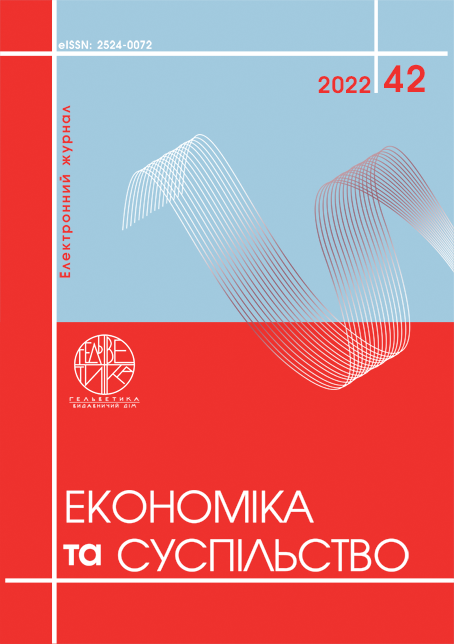CONFLICTS IN THE TOURISM FIELD: THEORETICAL ASPECT
Abstract
The article examines the theoretical foundations of conflicts that occur at enterprises in the tourism industry. The role of conflict depends on how effectively it is managed. To manage conflict, we must understand the causes of conflict situations. For the most part, managers consider personal conflicts to be the main cause of conflict. However, the analysis shows that the blame often lies with other factors related to work processes, the inadequacy of modern production, the distribution of produced products and differences in interests. Managing a conflict situation requires determining the main types of conflicts, their causes and methods of resolution. The perception of a specific situation depends on the desire to achieve one or another goal. Instead of objectively assessing the situation, people may consider only what they believe is favorable to the group and their needs. Conflicts can have an explicit or hidden form. Open labor disputes often arise on a business basis and are characterized by a clear conflict between the parties – contempt. In a hidden conflict, there are no open acts of aggression between the parties. In a conflict situation, the subject and object of the dispute are potential participants in the conflict. The objective causes of conflicts can be conventionally grouped into several groups: limited resources for distribution; functional interdependence; differences in goals; differences in values, behavior and life experience are the most common causes of conflicts; unsatisfactory interaction; sudden changes of events. Prolonged and intense conflicts can lead to crisis situations and bring significant changes. A productive struggle, like a general struggle, goes through the stages of: birth, development, flowering and fading. At the initial stage, the conflict is hidden and develops on a psychological level, so it is often avoided or hidden. Among the symptoms of this condition are a high level of unemployment, a careless attitude to one's duties, the use of official means to avoid work, increased drunkenness, etc. Every manager is interested in resolving the conflict that has arisen in his company as soon as possible, because the consequences can lead to moral and material damage. This process can take place without his participation, by the parties, as well as with his active intervention and management.
References
Закордонець Н. І. Можливості реалізації передових ідей швейцарського досвіду професійної підготовки майбутніх фахівців сфери туризму у вищих навчальних закладах України. Наукові записки Тернопільського національного педагогічного університету імені Володимира Гнатюка. Сер. Педагогіка. 2012. № 3. С. 135–144.
Кіссе А. І. Етнічний конфлікт: теорія і практика управління. Політологічний аналіз. Монографія. Київ : Логос, 2006. 380 с.
Козловський Є. В. Правове регулювання туристичної діяльності : навч. посібник. Київ : Вид-во «Центр навчальної лiтератури», 2015. 272 с.
Разумова О. О. Вплив етнорелігійних конфліктів на розвиток міжнародного туризму. URL: http://www.kymu.edu.ua/vmv/v/p01/19%20razumova.pdf
Федорченко В. К., Пазенок В. С., Кручек О. А. та ін. Туризмологія: концептуальні засади теорії туризму : монографія. Київ : ВЦ «Академія», 2013. 368 с.
Amichai-Hamburger Y. Reducing intergroup conflict in the digital age / The handbook of intergroup communication / edited by Robert T. Craig. New York: Routledge, 2012. pp. 181193.
Zakordonets N. I. (2012) Mozhlyvosti realizatsii peredovykh idei shveitsarskoho dosvidu profesiinoi pidhotovky maibutnikh fakhivtsiv sfery turyzmu u vyshchykh navchalnykh zakladakh Ukrainy [Opportunities for realization of advanced ideas of Swiss experience of professional training of future tourism specialists in higher educational institutions of Ukraine]. Scientific notes of Ternopil National Pedagogical University named after Volodymyr Hnatyuk, vol. 3, pp. 135–144.
Kisse A. I. (2006) Etnichnyi konflikt: teoriia i praktyka upravlinnia [Ethnic conflict: Theory and management practices. Polithological analysis]. Monograph. Kyiv: Logos, 380 p.
Kozlovsky Ye. V. (2015) Pravove rehuliuvannia turystychnoi diialnosti: navch. posibnyk [Legal regulation of tourist activity]. Kyiv: Vyd-vo «Tsentr navchalnoi literatury», 272 p.
Razumova O.O. Vplyv etnorelihiinykh konfliktiv na rozvytok mizhnarodnoho turyzmu [Influence of ethno-religious conflicts on the development of international tourism]. Available at: http://www.Kymu.edu.ua/vmv/V/p01/19%20razumova.pdf
Fedorchenko V. K., Pazenok V. S., Kruchek O. A., etc. (2013) Turyzmolohiia: kontseptualni zasady teorii turyzmu : monohrafiia [Conceptual principles of the theory of tourism]. Kyiv: VTs «Akademiia», 368 p.
Amichai-Hamburger Y. (2012) Reducing the intergroup conflict in the digital age / the handbook of intergroup communication / edited by Robert T. Craig. New York, pp. 181193.


